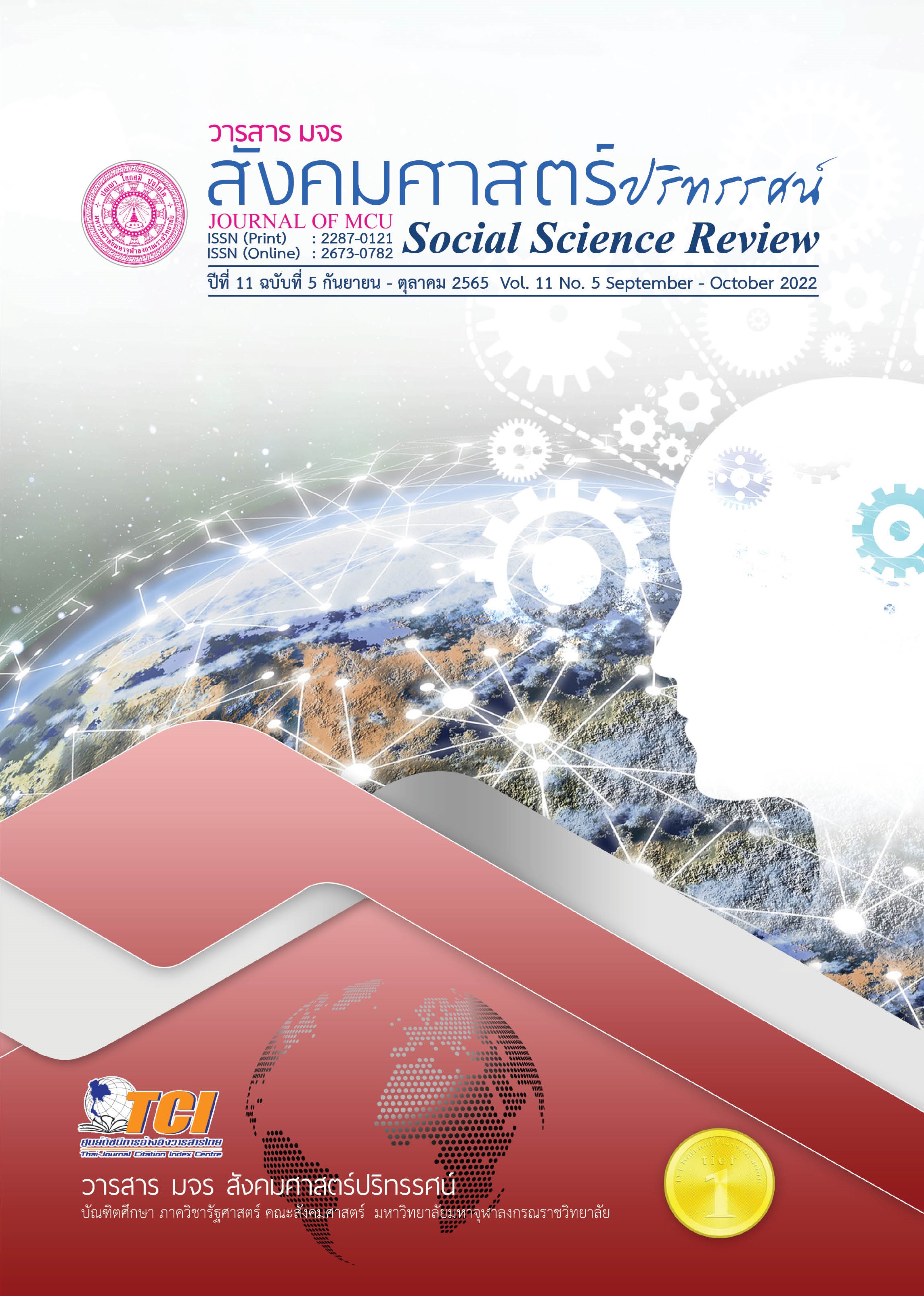รูปแบบการบูรณาการหลักพุทธธรรมเพื่อเพิ่มประสิทธิผลในการปฏิบัติงาน ตามยุทธศาสตร์ของกรมปศุสัตว์กระทรวงเกษตรและสหกรณ์
คำสำคัญ:
การบูรณาการหลักพุทธธรรม, การปฏิบัติงานตามยุทธศาสตร์, เพิ่มประสิทธิผลบทคัดย่อ
บทความวิจัยนี้มีวัตถุประสงค์เพื่อ 1. ศึกษาระดับประสิทธิผลในการปฏิบัติงาน 2. ศึกษาปัจจัยที่ส่งผลต่อการเพิ่มประสิทธิผลในการปฏิบัติงาน และ 3. นำเสนอรูปแบบการบูรณาการหลักพุทธธรรมเพื่อเพิ่มประสิทธิผลในการปฏิบัติงานตามยุทธศาสตร์กรมปศุสัตว์ เป็นการวิธีวิจัยแบบผสานวิธี การวิจัยเชิงปริมาณใช้แบบสอบถามที่มีค่าความเชื่อมั่นเท่ากับ 0.990 เก็บข้อมูลจากกลุ่มตัวอย่าง คือ บุคลากรของกรมปศุสัตว์ในพื้นที่กรุงเทพและปริมณฑล จำนวน 450 ตัวอย่าง วิเคราะห์ข้อมูลหาค่าความถี่ ค่าร้อยละ ค่าเฉลี่ย ส่วนเบี่ยงเบนมาตรฐานและการวิเคราะห์โมเดลสมการโครงสร้าง (SEM) โดยใช้การวิเคราะห์องค์ประกอบเชิงยืนยัน (CFA) การวิจัยเชิงคุณภาพใช้วิธีสัมภาษณ์เชิงลึกกับผู้ให้ข้อมูลสำคัญ จำนวน 20 รูปหรือคนแบบเฉพาะเจาะจง วิเคราะห์ข้อมูลโดยการวิเคราะห์เนื้อหาเชิงพรรณนาและการสนทนากลุ่มเฉพาะจำนวน 10 รูปหรือคน เพื่อยืนยันโมเดลหลังจากการสังเคราะห์ข้อมูล
ผลวิจัยพบว่า 1. ประสิทธิผลในการปฏิบัติงานตามยุทธศาสตร์กรมปศุสัตว์ โดยภาพรวมอยู่ในระดับมาก 2. ปัจจัยที่ส่งผลต่อประสิทธิผลในการปฏิบัติงานตามยุทธศาสตร์กรมปศุสัตว์ โดยรวมร้อยละ 87 และ 3. รูปแบบการบูรณาการหลักพุทธธรรมเพื่อเพิ่มประสิทธิผลในการปฏิบัติงานตามยุทธศาสตร์กรมปศุสัตว์ มีปัจจัย คือ การนำนโยบายไปปฏิบัติและการบริหารจัดการองค์การ แล้วจึงบูรณาการหลักพุทธธรรมคือหลักสัปปุริสธรรม 7 เพื่อให้เกิดประสิทธิผลในการปฏิบัติงานตามยุทธศาสตร์กรมปศุสัตว์
เอกสารอ้างอิง
กองแผนงาน กรมปศุสัตว์. (2563). ยุทธศาสตร์กรมปศุสัตว์ พ.ศ.2563-2565. สืบค้น 10 ตุลาคม 2563, จาก http://planning.dld.go.th/th/index.php/th/plan-menu
ถนัด ไชยพันธ์. (2561). การประยุกต์ใช้หลักพุทธธรรมเพื่อการส่งเสริมประสิทธิผลในการบริหารงานขององค์กรปกครองส่วนท้องถิ่น จังหวัดอุบลราชธานี (วิทยานิพนธ์พุทธศาสตรดุษฎีบัณฑิต สาขารัฐประศาสนศาสตร์) พระนครศรีอยุธยา: มหาวิทยาลัยมหาจุฬาลงกรณราชวิทยาลัย.
พระครูวิสุทธิสีลาภิวัฒน์ (เมธาภิวัฒน์ ฐิติโก). (2563). การขับเคลื่อนแผนยุทธศาสตร์การปฏิรูปกิจการพระพุทธศาสนาด้าน การปกครองของคณะสงฆ์จังหวัดสระบุรี (วิทยานิพนธ์พุทธศาสตรดุษฎีบัณฑิต สาขาการจัดการเชิงพุทธ) พระนครศรีอยุธยา: มหาวิทยาลัยมหาจุฬาลงกรณราชวิทยาลัย.
ภูษิต วิเศษคามินทร์. (2563). ประสิทธิผลการนำนโยบายการแก้ปัญหาจราจรไปปฏิบัติของกองบังคับการตำรวจจราจร (ดุษฎีนิพนธ์ปรัชญาดุษฎีบัณฑิต สาขาวิชารัฐประศาสนศาสตร์).พระนครศรีอยุธยา: มหาวิทยาลัยมหาจุฬาลงกรณราชวิทยาลัย.
มหาวิทยาลัยมหาจุฬาลงกรณราชวิทยาลัย. (2539). พระไตรปิฎกฉบับภาษาไทย ฉบับมหาจุฬาลงกรณราชวิทยาลัย. กรุงเทพฯ: โรงพิมพ์มหาจุฬาลงกรณราชวิทยาลัย.
วงเพชร คงจันทร์. (2556). การศึกษาวิเคราะห์ความสัมพันธ์ระหว่างหลักพุทธธรรมกับหลักกฎหมาย: กรณีศึกษาพระราชบัญญัติคุ้มครองผู้ถูกกระทำด้วยความรุนแรงในครอบครัว (วิทยานิพนธ์พุทธศาสตรดุษฎีบัณฑิต สาขาวิชาพระพุทธศาสนา) พระนครศรีอยุธยา: มหาวิทยาลัยมหาจุฬาลงกรณราชวิทยาลัย.
ภักดี รัตนมุขย์. (2561). THAILAND 4.0 ตอบโจทย์ประเทศไทย?. กรุงเทพฯ: โรงพิมพ์ปัญญาชน.
ยุทธศาสตร์ชาติ พ.ศ. 25561-2580. (2561, 13 ตุลาคม). ราชกิจจานุเบกษา. เล่มที่ 135 ตอนที่ 82 ก. หน้า 1.
อำพล ปุญญา. (2560). รูปแบบการบริหารจัดการน้ำตามหลักพุทธวิธีของจังหวัดพิจิตร (วิทยานิพนธ์พุทธศาสตรดุษฎีบัณฑิต สาขารัฐประศาสนศาสตร์). พระนครศรีอยุธยา: มหาวิทยาลัยมหาจุฬาลงกรณราชวิทยาลัย.
Edwards, G. C. (1980) Implementing Public Policy. Washington. D.C: Congressional Quarterly Press.
Fayol, H. (2016) General and Industrial Management. Paris; Castres: ÉDI-gestion: ANDESE.
ดาวน์โหลด
เผยแพร่แล้ว
รูปแบบการอ้างอิง
ฉบับ
ประเภทบทความ
สัญญาอนุญาต
ลิขสิทธิ์ (c) 2022 วารสาร มจร สังคมศาสตร์ปริทรรศน์

อนุญาตภายใต้เงื่อนไข Creative Commons Attribution-NonCommercial-NoDerivatives 4.0 International License.
เพื่อให้เป็นไปตามกฎหมายลิขสิทธิ์ ผู้นิพนธ์ทุกท่านต้องลงลายมือชื่อในแบบฟอร์มใบมอบลิขสิทธิ์บทความให้แก่วารสารฯ พร้อมกับบทความต้นฉบับที่ได้แก้ไขครั้งสุดท้าย นอกจากนี้ ผู้นิพนธ์ทุกท่านต้องยืนยันว่าบทความต้นฉบับที่ส่งมาตีพิมพ์นั้น ได้ส่งมาตีพิมพ์เฉพาะในวารสาร มจร สังคมศาสตร์ปริทรรศน์ เพียงแห่งเดียวเท่านั้น หากมีการใช้ภาพหรือตารางหรือเนื้อหาอื่นๆ ของผู้นิพนธ์อื่นที่ปรากฏในสิ่งตีพิมพ์อื่นมาแล้ว ผู้นิพนธ์ต้องขออนุญาตเจ้าของลิขสิทธิ์ก่อน พร้อมทั้งแสดงหนังสือที่ได้รับการยินยอมต่อบรรณาธิการ ก่อนที่บทความจะได้รับการตีพิมพ์ หากไม่เป็นไปตามข้อกำหนดเบื้องต้น ทางวารสารจะถอดบทความของท่านออกโดยไม่มีข้อยกเว้นใดๆ ทั้งสิ้น





